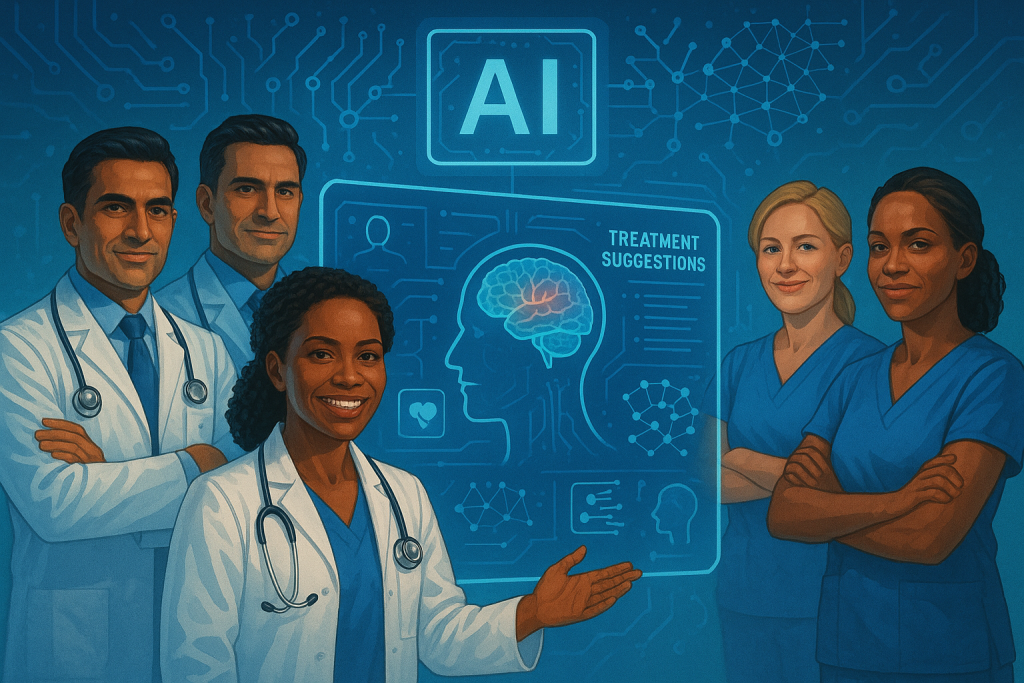
A recent publication in eClinicalMedicine delivers a timely and urgent message: Artificial Intelligence (AI) is no longer a futuristic concept in healthcare—it is already reshaping clinical practice. From diagnostics and treatment planning to patient communication and workflow optimization, AI is increasingly present in how we work. But with its growing presence comes a vital question: are clinicians truly prepared to use it effectively and responsibly?
The answer, for many, is no. Despite the rapid advancement of AI tools, healthcare professionals are often left with minimal training or support in how to use them. We need more than just exposure—we need structured, role-specific education that equips clinicians to understand, evaluate, and apply AI in a way that prioritizes patient safety and clinical integrity.
A Practical Framework for AI Competency
The article proposes a three-level framework for AI competency among clinicians—offering a roadmap for growth regardless of experience or specialty.
At the basic level, clinicians should be able to use AI tools already integrated into their systems with confidence and safety. This includes knowing when an AI recommendation is helpful—and when clinical judgment must override it.
The proficient level goes deeper, requiring the ability to critically assess AI outputs, recognize and explain ethical risks, and communicate clearly with patients about how AI is influencing their care. It’s about transparency and accountability.
At the expert level, clinicians are not just users of AI—they become collaborators. They work with developers, contribute their field experience to guide innovation, and play an active role in shaping tools that reflect clinical realities rather than abstract models.
No Need to Code, But a Need to Understand
Clinicians don’t need to be programmers. But they do need to understand the foundations of how AI works: how it is trained, where bias can enter, and how outputs are generated. Without this understanding, there’s a risk of misuse—or worse, harm.
Patients trust us to explain the care they’re receiving, including the role of AI. That means we must be able to break down complex processes into language that empowers and informs. Whether we’re discussing a speech analysis tool, a diagnostic prediction model, or a therapy planning assistant, we remain the point of accountability.
Why This Matters for Every Health Professional
This is especially relevant for therapists, neuropsychologists, educators, and other professionals whose roles may not traditionally intersect with technology. As AI tools begin to assist with assessments, track progress, and even suggest interventions, we need to be prepared. Not only to use these tools, but to recognize their limitations, question their suggestions, and advocate for patients when needed.
In addition, AI literacy empowers clinicians to push for better tools. When we can articulate what works—and what doesn’t—we become partners in shaping the future of clinical technology. We ensure that AI evolves with human care at its core.
Two More Reasons This Shift Matters
First, equity in care is at stake. AI systems are only as good as the data they are trained on, and historical data can carry bias. Clinicians must be equipped to recognize these patterns and intervene when necessary to protect vulnerable populations.
Second, the pace of change is accelerating. New tools are being released faster than guidelines can keep up. Without foundational AI knowledge, clinicians may struggle to keep pace—or worse, may become passive users in a system they don’t fully understand.
The Shift Is Already Happening—Let’s Lead It
Healthcare is undergoing a transformation, and AI is a key driver of that change. But technology alone cannot improve care. It takes knowledgeable, critically-minded clinicians to ensure that AI is used ethically, safely, and meaningfully.
Whether you’re a student, a practicing clinician, or an educator training the next generation, this framework offers a roadmap—not just to catch up with the future, but to help lead it.
AI is here. Education is not optional. It’s time to prepare—and to take part in shaping what comes next.
In our next edition, we’ll explore how therapists across disciplines can begin to integrate AI tools into everyday practice—without losing the human connection that makes therapy so powerful. From digital progress tracking to personalized interventions, we’ll look at what’s already working—and what still needs to improve.
Reference:
Schubert, T., Oosterlinck, T., Stevens, R. D., Maxwell, P. H., & van der Schaar, M. (2025). AI education for clinicians. eClinicalMedicine, 79, 102968. https://doi.org/10.1016/j.eclinm.2024.102968ScienceDirect
